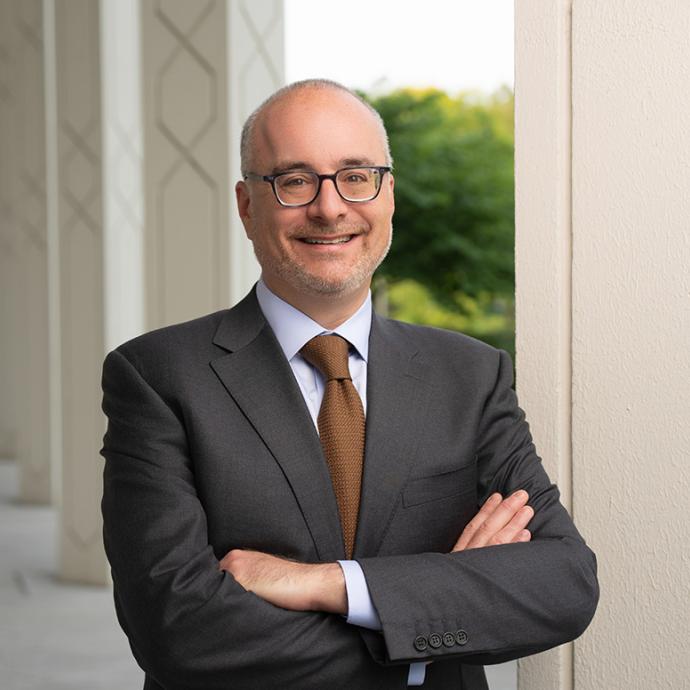John Eaton, a pioneering composer known for his chamber operas and advances in electronic music, died Dec. 2 from a massive brain hemorrhage. Eaton, 80, was professor emeritus in music.
A 1990 MacArthur fellow, Eaton drew praise for his inventive style and sound—one critic dubbed him “the most interesting opera composer writing in America today.” He was especially known for small-ensemble operas in which instrumentalists joined the action, dancing and acting onstage alongside the vocalists.
“John Eaton was a composer unlike any other,” remembered his friend and UChicago colleague Shulamit Ran, the Andrew MacLeish Distinguished Service Professor Emeritus in Music. In all his work, “his own, thoroughly personal voice always prevailed. Everything that he did had a deeply musical impulse to it—passionate and profoundly human.”
Eaton studied composition under Milton Babbitt and Roger Sessions at Princeton University, where he received his bachelor’s degree in 1957 and his MFA in 1959. Both “encouraged me to go my own way,” he recalled later.
Eaton’s compositions owe their distinctive sound to his use of microtones—notes the fall between the traditional 12 tones of the Western musical scale.
His exploration of microtonal music grew out of his experiences as a jazz pianist. Unlike the saxophonists with whom he performed, Eaton couldn’t “bend” notes to alter their pitch. “As a pianist, my notes were fixed,” Eaton explained to NewCity in January 2015.
To achieve the diversity of sounds he wanted, Eaton developed a novel technique: For his 1964 piece “Microtonal Fantasy,” a single pianist plays two pianos tuned a quarter-tone apart.
The result is what Eaton’s colleague and fellow composer Augusta Read Thomas describes as “unusual and personal harmonic fabrics of sound.” She added, “when I hear his work, I feel like I’ve entered into this unique, otherworldly place that he’s taking me on a beautiful adventure.”
Eaton’s search for a subtler and expressive keyboard led him to collaborate with Robert Moog, inventor of the famed Moog synthesizer. Together, the pair developed a sophisticated new synthesizer, which featured three 49-key keyboards. Each key was programmed to respond to five different motions, like the finger’s front and back position on each key or the pressure on the key when pushed.
When the Eaton-Moog Multiple-Touch-Sensitive Keyboard was unveiled in 1992, Eaton declared it “the world’s most sensitive instrument next to the human voice. Playing it is a kind of combination of playing a very sensitive stringed instrument and playing a keyboard instrument.” Eaton gave his invention its first live concert performance in Mandel Hall in May 1992 in a piece called “Genesis.”
That same concert also featured the world premiere of Peer Gynt, an intimate chamber opera. It was one of Eaton’s many operas inspired by literature or folklore, including Don Quixote, The Tempest, The Cry of Clytaemnestra and Myshkin, which was broadcast on PBS and received a Peabody Award. He also explored modern themes: In 1995, Eaton collaborated with UChicago colleague and acclaimed novelist Richard Stern on the libretto for the 1995 satirical opera Golk, which examines a “Candid Camera”-esque TV show.
To support the production of his work, Eaton founded the Pocket Opera Company in 1992. The nimble company featured only about a dozen freelance musicians and eschewed elaborate sets and costumes, giving them the freedom to perform almost anywhere. Eaton continued to lead the ensemble after retiring in 2001.
In retirement, Eaton also maintained close ties to the University. Most recently, he composed “The End Of It” for the 50th anniversary of the contemporary music ensemble Contempo. Eaton composed “The End Of It” with an awareness that it might be among his final works; shortly before its premiere, he told Ran that it meant more to him than any other work he had composed.
Family members recall Eaton as a man whose heart matched his intellect. His warm presence and twinkling wit made Eaton a favorite host among his friends, who dropped by to enjoy his expert cooking, as well as his company. Eaton also enjoyed reading classic literature, traveling to Rome and spending time with his beloved cat, Bobok.
“It seems almost incomprehensible to accept that he is no longer with us,” Ran said. “But his art will remain alive—through the huge repertoire of operas, song cycles, and much more, that he left as his legacy.”
Eaton is survived by his wife, Nelda Nelson-Eaton, and his children, Estela and Julian Eaton. A wake will be held Dec. 10 at the Eaton home in New Jersey. A memorial concert is planned for March 2016 in New York.










 —Prof. Kunle Odunsi
—Prof. Kunle Odunsi
